

THURSDAY, APRIL 24 at 7:30 p.m.
HODGSON CONCERT HALL



THURSDAY, APRIL 24 at 7:30 p.m.
HODGSON CONCERT HALL
Thursday, April 24, 2025 at 7:30 p.m.
Hugh Hodgson Concert Hall
UGA Performing Arts Center
University of Georgia Symphony Orchestra
Mark Cedel, conductor
University of Georgia Hodgson Singers
Daniel Bara, conductor
University Chorus, UGA Glee Clubs
Daniel Shafer, conductor with Elizabeth Johnson Knight, mezzo-soprano
Amy Petrongelli, soprano
Presented as part of our Thursday Scholarship Series
The Thursday Scholarship Series began in 1980, and continues the tradition of “Music Appreciation Programs” started by Hugh Hodgson in the 1930s. Proceeds from ticket sales to these concerts and contributions made by you are the primary means through which School of Music scholarship funds are raised each year.
Symphony No. 2 “Resurrection”
I. Allegro maestoso
II. Andante moderato
Gustav Mahler (1860 –1911)
III. In ruhig fließender Bewegung (With quietly flowing movement)
IV. “Urlicht” (Primal light)
V. Im Tempo des Scherzos (In the tempo of the scherzo)
Scored for: four flutes (all doubling piccolo), four oboes (3rd and 4th doubling english horn), five clarinets in B-Flat, A, C, plus E-flat and bass clarinet, four bassoons (3rd and 4th doubling contrabassoon), ten horns (three also offstage), six trumpets (plus four offstage), four trombones, one tuba, two sets of timpani, bass drum, snare drum, triangle, cymbals, two tam-tams, rute, glockenspiel, organ, strings. 80:00
At the end of the 19th century, Gustav Mahler stood at a crossroads. Already a respected conductor, he was still forging his voice as a composer. His first symphony had met with a mixed reception, and the genre itself—the symphony—was under pressure. Beethoven had already stretched it to its emotional and structural limits; Bruckner had monumentalized it. Where could it go from there?
Mahler’s answer, in his Symphony No. 2 in C minor, was both radical and deeply personal. He reimagined the symphony not as an abstract form, but as a vessel for existential inquiry. Over the course of five movements and nearly 90 minutes, the “Resurrection” symphony takes listeners on a vast emotional and spiritual arc—from death and desolation, through memory, irony, and longing, to a final transcendent vision of renewal. Premiered in Berlin in 1895 with Mahler himself conducting, the Symphony No. 2 was met with astonishment and acclaim.
The symphony was completed in 1894. Its roots go back to 1888, when Mahler composed what would become the first movement: a monumental funeral march in C minor. Originally conceived as a standalone tone poem titled Totenfeier (Funeral Rites), this opening movement is both a memorial and a crisis. Mahler described it as portraying the death of a hero—possibly the same protagonist from his first symphony—and the emotional chaos that follows. The music is taut, volatile, and often searing in its intensity. There is no consolation here, only a demand for reckoning.
What follows are two movements that seem, on the surface, to step away from this grief. The second movement is a gentle Andante, cast in the style of an Austrian Ländler. It evokes a world of pastoral innocence, of remembered dances and simpler times—yet Mahler’s subtle tempo shifts and harmonic wanderings suggest that even this nostalgia is tinged with fragility. The third movement turns sharply toward the grotesque. Based on Mahler’s own Des Knaben Wunderhorn song “St. Anthony of Padua’s Sermon to the Fishes,” the music moves in restless circles, parodying sacred oratory as the sermon falls on deaf ears. Here, Mahler gives voice to cosmic absurdity: the futility of preaching, the failure of meaning.
It is in the fourth movement, “Urlicht” (“Primeval Light”), that the soul begins to reorient itself. A mezzo-soprano soloist enters quietly, singing a Wunderhorn text that expresses a yearning for divine peace: “I am from God and will return to God.” Scored with radiant simplicity, Urlicht is a moment of profound stillness and sincerity—a spiritual turning point that prepares for the astonishing finale to come.
The fifth movement is nothing short of apocalyptic. It opens in terror: distant thunder, shrieks of brass, and disintegration. Mahler here paints a sonic depiction of the Last Judgment—not through dogma, but through deeply theatrical and symbolic means. Themes from earlier movements reappear in new guises, and Mahler’s orchestration becomes increasingly unbound: offstage horns, percussion, and spatial effects expand the sonic landscape far beyond the visible stage.
Then, suddenly, silence. From the hush emerges the choir, almost imperceptibly, with a setting of Friedrich Klopstock’s “Resurrection Ode.” Mahler adds his own verses, deepening the work’s spiritual dimension. What follows is among the most transcendent passages in all of Western music. The choir sings not of a literal resurrection, but of an inner, universal awakening. In Mahler’s hands, resurrection becomes not a theological promise, but a metaphor for the soul’s capacity to rise—after grief, after despair, into light.
In many ways, the Resurrection Symphony represents the crystallization of Mahler’s lifelong concerns: death, redemption, the meaning of suffering, the search for God. It was also a work that laid the foundation for his future symphonies, each of which would build on the idea that the symphony could encompass the world—“like a river taking in everything,” as Mahler once said.
Today, it remains one of the most powerful and deeply human works in the symphonic repertoire. Not simply for its grandiosity, but for its honesty. It confronts terror and beauty, silence and song, despair and the fragile hope of transcendence. In the end, Mahler’s Resurrection does not resolve the mystery of death—it transforms it. Through music, Mahler dares to imagine that what lies beyond might not be the end, but the beginning of something vast and luminous.
Program Notes by Nicholas Han
O Röschen rot,
Der Mensch liegt in größter Not, Der Mensch liegt in größter Pein, Je lieber möcht’ ich im Himmel sein. Da kam ich auf einen breiten Weg, Da kam ein Engelein und wollt’ mich abweisen, Ach nein, ich ließ mich nicht abweisen.
Ich bin von Gott, ich will wieder zu Gott, Der liebe Gott wird mir ein Lichtchen geben, Wird leuchten mir bis in das ewig selig Leben.
O little rose red
Humanity lies in greatest need, Humanity lies in great agony, Ever I would prefer to be in Heaven. Then I came upon a wide path There came an angel who wanted to turn me away. But no, I did not let myself be turned away.
I am from God, I want to return to God, The loving God will give me a little light, Which will light me into eternal, blessed life.
Aufersteh’n, ja aufersteh’n wirst du,
Mein Staub, nach kurzer Ruh!
Unsterblich Leben
Wird der dich rief dir geben.
Wieder aufzublüh’n wirst du gesät!
Der Herr der Ernte geht
Und sammelt Garben
Uns ein, die starben.
O glaube, mein Herz, o glaube:
Es geht dir nichts verloren!
Dein ist, was du gesehnt!
Dein, was du geliebt, was du gestritten!
O glaube:
Du wardst nicht umsonst geboren!
Hast nicht umsonst gelebt, gelitten!
Was entstanen ist, das muß vergehen!
Was vergangen, auferstehen!
Hör’ auf zu beben!
Bereite dich zu leben!
O Schmerz! Du Alldurchdringer!
Dir bin ich entrungen!
O Tod! Du Allbezwinger!
Nun bist du beqwungen!
Mit Flügeln, die ich mir errungen
In heißem Liebesstreben
Wer’ ich entschweben
Zum Licht, zu dem kein Aug’ gedrungen! `
Sterben werd’ ich, um zu leben!
Aufersteh’n, ja aufersteh’n wirst du, Mein Herz, in einem Nu!
Was du geschlagen,
Zu Gott wird es dich tragen!
Rise again, yes, you will rise again.
My dust, after a short rest!
Immortal life
He who called you will give to you.
To blossom again you are sown!
The lord of the harvest goes
And gathers, like sheaves, We who died.
O believe, my heart, o believe:
Nothing is lost to you!
It is yours, what you desired.
It is yours, what you loved, what you struggled for.
O believe:
You were not born in vain!
You have not lived, suffered in vain!
What came into being, it must cease to be!
What passed away, it must rise again!
Stop trembling!
Prepare yourself to live!
Oh grief! You all-penetrator!
I am forced to you
O death! You all-conqueror!
Now you are defeated!
With wings that I won for myself
In fervent pursuit of love
I will waft away
To the light that no eye has penetrated
I shall die in order to live.
Rise again, yes, you will rise again,
My heart, in a moment!
What you bested
It will carry you to God!
Jhonni Campos, co-concertmaster
Carlos Brena, co-concertmaster
Sarah Nienhiser
Clarissa Tamara
Brian Roach
Alexis Boylan
André Araújo de Souza
Zeyu Yuan
Lela Stair
Chelsea Afful
Simms Murray
Ellis Kim
Adelmo Giménez
Rohan Pise
Rea Aiyer
Ori Kang, principal
Sage Codispoti
Ruanak Das
Nick Olmstead
Kiera Johnson
Surya Blasiole
Athziri Moreno-Martinez
Jen Edwards
Sarah Wheeler
Briana Darden
Leo Jahn
Hazel Moreno
Shazan Samnani
Chloe James
Mark Cedel, Conductor
Nicholas Han, Assistant Conductor
VIOLA
Rachel Liu, co-principal
Asha Baylor, co-principal
Jenni Perng, assistant principal
Kailey Ford
Daniel Boscan
Marissa Evans
Mason Minutella
Adam Starks
Ashley Belscher
Clinton Stempien
Vic Jeon
Dorothy Park
Tess Redden
CELLO
Gabriella McClellan, principal
Tristan Dempsey, assistant principal
Joshua Nguyen
Thomas LaMon
Olivia Durrence
Ryan Dater
Ian Koontz
William Slater
Joshua Aderhold
Benjamin Hackworth
Zach Helms
BASS
Wueliton Dal Pont, principal
Bianca Wilson
Michael Farrick
Austin Carter
Ricardo Karelisky
Jordan Askew
Madeline Bower
Emily Elmore, principal
David Ma
Lauren Wiggins
Shana Stone
OBOE
Marissa Ankeny, principal
Anisa Herbert
Xander Herman
Emma Gordon, English horn
CLARINET
Timothy Fitzgerald, principal
Claudia Reve Romero
Emily Johnston
Sarah Christine Frois
Garrison Rider
BASSOON
JT Holdbrooks, principal
Hsin Cheng
Daniel Johnson
Natasha Pizarro Guerrero, contra
HORN
Joshua Wood, principal
Baylee Cook, assistant principal
Connor Parr
Marianna Schwark
Anleah Walker
Joseph Johnson
Jake Wadsworth
TRUMPET
Victor Pires, principal
James Vaughn, assistant
Toby Johnson
Gilbert Villagrana
Michael Mank, assistant
Will Tomaszewski
Adriano Estraiotto
Ben Stocksdale
TROMBONE
Jose Vasquez, principal
Ben Novo
Thomas Pajares
Victor Guevara, bass
TUBA
Jack Neja, principal
PERCUSSION
Hsiao Huang, principal
Meme Walton
Dane Warren
Grayson Pruitt
Tanner Fallin
Rachel Martin
KEYBOARD
Tiffany Yin
HARP
Isabel Hardy
Dania Lane
HORN
Jacob Evarts
Gracie Gambrell
Peter Dixon
Justin White, Conductor
TRUMPET
Will Cuneo
Colin Kennedy
Cameron Butryn
Palmer Hartley
Ziyi Zhang
Amanda Ferreira
Ava Bogarde
Zaria R. Doss
Hope Unger
Victoria Goodnature
Shelby Laird *
Joy McCarthy
Laurel McFarland
Grace Ann Miller
Nova Senkyrick
Meera Srinivasan
Audrey Vazquez
Lillie Sims
Margaret Wilson
LIBRARIAN
Alexis Boylan
PERSONNEL and PRODUCTION
Ricardo Karelisky
Marianna Baccus
Elle Dignam
Quinn Dillard
Sarah Dudley
Conductor
Noah Colwell
Aidan Eclavea
Ian Harding
Trey Heaton
Elisa Garcia-Carreras
Sydney Godfrey
Caroline Malcom
Danielle Olivares
Shayna Suddeth
Taya Taylor
De’Nasia Thomas
Audrey Raynor
Danielle Vergara
Rayvon Love *
Will Pollard
Julian Rivera-Summerville
Liam Mueller
Sean Wilson
*denotes graduate student conductor
JR Banitt
Milo Bauman
Thomas Dixon *
Peter Kandra
Owen Margaret-Verrett
Walter Moody
Braden Rymer *
Sam Son
Liam Taylor
Josh Wagner *
Daniel Shafer, Conductor
Thomas Dixon, Graduate Assistant and Conductor
Aimee Li, Accompanist
Sophia Aiello
Martin Arnade
Andreea Barca
Bennett, Caleb
Josie Bowden
Katie Boyle
Katie Beth Brewer
Jackie Broadwell
Benjamin Brown
Steven Brown
Shirley Chen
Jayden Chong
Mason Christmas
Ana Corre
Prerana Daga
Ellen Daniel
Benjamin Daugherty
Grace Deaton
Melina De la Vega
Eliza Dempsey
Gianna DiMuzio
Paul Downey
Sherry Downey
Mona Dunn Betanzos
Rayna Dyke
Tanner Dziedzic
Caroline Echols
Jeffery Fairley
Chloe Floyd
Alice Gardner
Libby Grace Garrett
Lizzie Gesner
Kate Gottsman
Emily Grabowski
Anna Grubbs
Richard Guyton
Abigail Hallman
Mia Hansen
Zuri Consuela Harris
Chris Herring
Abby Herring
Rhonda Herring
Obed Hessou
Henry Heydinger
Anaya Hilson
Emma Hu
Eleanor Iskander
Maya Iyer
Hali Jang
Jasmine Jensen
Aakash Joshi
Hyejun Kang
Elijah Kenyon
Beata Kochut
Micah Laird
Shelby Laird
Adalyn Ledbetter
Beth Lewis
Rayvon Love
Jennifer Luo
Adelaide Mangum
Jeanne Marie Martineau
Finn McClelion
Ansley McNeese
Kathryn Miller
Shelby Miller
Phoebe-Agnès Mills
Claire Murphy
Caitlien Nguyen
Camilla Nivison
Megan Ostrat
Lexi Paduraru-Lambert
Elizabeth Pearce
Marjorie Pearce
Hannah Perdue
Alex Porlier
Madeleine Proctor
Alanna Quinn
Anne Rogan
Braden Rymer
Pragya Salian
Emma Savage
Daniel Shafer
Sneha Sharma
Benjamin Sharp
Sam Son
Angela Stewart
Abigail Suarez
Amber Sugarman
Riley Sullens
Aidan Thompson
Alexia Toma
Joseph Torok
Matthew Turbeville
Landon Vaughn
Jenna Vidal
Sarah Visser
Josh Wagner
Marie Wagner
Julia Warren
Gary Weed
Laura Weeks
Beth Weigle
Colin West
Karen Whelchel-Redwine
Jane Whitehead
Isaiah Williams
Sandy Woods
Libby Zavadil
Atara Zibitt
SOPRANO I
Avery Britt
Lee Comeaux
Briana Darden
Kate Gottsman
Paige Hall
Emaline Newbury
Shaoey Pace
Maura Potvin
Lauren Smith
Brynn Spicer
Emily Taylor
TENOR I
Lucas Clements
Rayvon Love
Sean Wilson
Daniel Shafer, Conductor
Josh Wagner, Graduate Assistant & Conductor
Haoying Wu, Accompanist
SOPRANO II ALTO II
Rylee Aguirre
Sophia Cuevas
Emily Forshee
Eliza Gavin
Livana Lekas
Amanda Robinson
Ange Sanchez Fuentes
Ansleigh Seay
Abby Wright
Logan Wynns
ALTO I
Mariah Arnold
Lucy Smith Biemiller
Ellie Brown
Jenny Edwards
Kaitlyn Hartman
Hailey Hilton
Meredith Hoots
Emma Sue Mitchell
Elisa Ortiz Rodriguez
Mallika Suyal
Jeilyn White
Linda Williams
Julie Aldridge
Anna Bossert
Kailey Bridgette
Jana Hornsey
Gabby Lawson
Sparrow Mackenna
Brenna Pursley
Kathryn McWhorter
J’’Myya Williams
Toni Williams
Sophie Schug
Deaja Jones
Daniel Shafer, Conductor
Shelby Laird, Graduate Conductor
Rayvon Love, Graduate Assistant
Eva Panagou, Accompanist
TENOR II
Chase Crumbley
Evan Lambert
Bryson Maycumber
Ethan Olah
Arthur Radosavljevic
Judson Stricklin
BASS I
West Clayton
Thom Dixon
Gavin Edwards
Riley Eckstrom
Jake Kinney
Andrew Latimer
Owen Margaret-Verrett
Walter Moody
Joshua Wagner
BASS II
Justin Herring
Jackson Hamilton
Aaron Knapp
Sebastian Paragas
Braden Rymer
Alexander Wiegand
Now in his 31st year at UGA, Mark Cedel brings a wealth of professional experience to his position as Director of Orchestral Activities. Prior to his appointment at UGA, he was Associate Conductor of the Charlotte Symphony Orchestra. In his four seasons with that orchestra, he conducted over 200 performances; appearing on every series offered by the orchestra. Before joining the Charlotte Symphony, Cedel was Principal Viola and Assistant Conductor of the Charleston (SC) Symphony Orchestra for nine years. While in Charleston, he served for two seasons as that orchestra’s Acting Music Director. From 1986-1990, he was a member of the artist faculty at the Brevard Music Center and was principal conductor of the Brevard Repertory Training Program.
In addition to directing orchestral activities at UGA, Cedel served as professor of viola from 19942002. During that period he performed, toured, and recorded regularly as extra/substitue viola with the Atlanta Symphony Orchestra, including its northeast tour with concerts in Carnegie Hall. He returned to teaching viola for the 2009-2010 academic year, while a search was conducted to fill the position.
Cedel has been associated with many orchestras in the southeast. This includes Principal Viola of the South Carolina Chamber Orchestra and the Guest Principal Viola of the Savannah Symphony, and orchestras in Augusta, Macon, and Jacksonville.
Cedel earned a bachelor of music degree in viola performance from the Curtis Institute of Music where he was a student of Joseph dePasquale, and studied chamber music with members of the Guarneri Quartet, Budapest Quartet and Beaux Arts Trio. He holds a master of music degree in conducting from the North Carolina School of the Arts.
Born and raised in Seattle, Washington, Nicholas Han earned his Undergraduate degree in Violin Performance at Central Washington University in 2020, and his Masters in Orchestral Conducting at Oklahoma State University in 2023. He is currently pursuing his Doctoral of Music Arts degree at University of Georgia.
In 2022, Nicholas was named assistant conductor for the Oklahoma Chamber Symphony and was the Apprentice Conductor for the Oklahoma City Philharmonic in May 2023. He also is currently the Cover Conductor for the Gwinnett Symphony Orchestra. His recent conducting engagements include guest conducting LA Conducting Workshop and Competition Orchestra and Gwinnett Symphony Orchestra. During the summer of 2022, Nicholas was selected as one of 3 winners for the ICWC (International Conducting Workshop and Competition) in Atlanta, Georgia. He was also selected as a 1st place winner and received the Audience Prize in the LA Conducting Workshop and Competition in Garden Grove, California.
He has worked with Mark Gibson, Neil Thomson, Diane Wittery, and Philip Greenberg. His principal mentors include Nikolas Caoile, Thomas Dickey, Alexander Mickelthwate, and Mark Cedel.
Daniel Bara is the John D. Boyd UGA Foundation Professor of Choral Music and the Director of Choral Activities and Professor of Music at the Hugh Hodgson School of Music at the University of Georgia where oversees seven university choral ensembles as well as the graduate choral conducting program. His university choirs have performed by juried invitation for state, regional, and national conventions of ACDA, MENC, and IMC. In spring of 2014 The UGA Hodgson Singers won the Grand Prix at the International Choral Competition Ave Verum in Baden, Austria and performed at the ACDA Southern Division Convention in Jacksonville, FL. His former MM and DMA conducting students now hold collegiate conducting appointments at Susquehanna University, New England Conservatory, Miami University of Ohio, University of Idaho, William Jewell College, as well as heads of church and school choral music programs throughout the country.
Prior to his appointment at UGA, Dr. Bara was the Director of Choral Activities at East Carolina University, where he received the UNC Board of Governors Distinguished Professor for Teaching Awardand the Robert L. Jones Award for Outstanding Teaching, and released two internationally distributed choral recordings, Greater Love (2007)and Eternal Light (2010) with Gothic Records. In 2001was a winner of the Walter Hagen Conducting Prize given at the Eastman School of Music, and the ACDA National Student Conducting Competition(Graduate Division) awarded at the National Convention in San Antonio, TX.
Daniel Shafer is currently pursuing his D.M.A. in Choral Conducting at the University of Georgia. Before his move to Athens, Daniel completed his M.M. in Choral Conducting at the University of Missouri - Columbia where he was the Director of Music at First Christian Church of Columbia, Missouri. Daniel also served as Music Director at Gray Memorial United Methodist Church in Tallahassee, FL while completing his B.M.E at Florida State University. Upon completing his undergraduate degree, Daniel became the Director of Choirs at Westminster Christian School in Miami, FL. During his tenure at Westminster, he led choral tours to London, Hawaii, Grand Cayman Islands, Walt Disney World, and Nashville. As a singer, Daniel has performed in productions of A Little Night Music, Don Giovanni, and Le portrait de Manon. He has also been a featured soloist with the Missouri Symphony Orchestra, University of Georgia University Chorus, Festival Singers of Florida, and Alarm Will Sound in performance with Meredith Monk.
Elizabeth Johnson Knight, American mezzo soprano, is in demand as both a choral and solo artist. She made her Carnegie Hall debut in 2010 as alto soloist in Handel’s Messiah with Andrew Megill and the Masterwork Chorus. Recent appearances include the role of Madame de Croissy in Poulenc’s Dialogues of the Carmelites with Louisiana Opera and guest solo appearances with the Duke Vespers Ensemble and the University of Illinois Chamber Singers/Sinfonia da Camera. Elizabeth has also sung in professional choral ensembles across the United States, including Orpheus Chamber Singers, Tennessee Chamber Chorus, Vox Humana, Kinnara Ensemble, and the South Dakota Chorale. She is a long-time member of the Chorale of the Carmel Bach Festival. She has recorded with many of these ensembles, including the GRAMMY-nominated Tyberg: Masses album with South Dakota Chorale.
Knight joined the faculty of the University of Georgia’s Hugh Hodgson School of Music in 2016 after holding teaching positions at Southeastern Oklahoma State University, the University of Louisiana, Monroe, Murray State University, the University of North Texas, and Richland College.
She is a 2022 recipient of UGA’s Sandy Beaver Excellence in Teaching Award. In addition to private voice, she has taught English, Italian, French, and German Diction, Vocal Pedagogy, and Opera Workshop. Her research interests include assessment techniques for the applied studio and the effects of posture on the acoustics of the singing voice. She has published research in Journal of Voice and has presented papers at the New Voice Educators’ Symposium, the Texoma NATS Artist Series, and the Performing Arts Medicine Association Symposium. Elizabeth is a graduate of the University of North Texas (DMA), Indiana University (MM), and the University of Mississippi (BM).
Lauded in the New York Times for her “admirable fluidity,” soprano Amy Petrongelli’s diverse performance career wholeheartedly embraces both traditional and contemporary repertoire. In 2020, Amy was honored with an Professional Achievement Award from the University of Michigan for her significant contributions to the field of music performance.
Amy has been a featured performer for organizations such as the Five Boroughs Music Festival, The Block, the Casement Fund Recital Series, the Great Lakes Chamber Music Festival, as well as national and regional conferences for the National Association for Teachers of Singing. Her commitment to musical collaboration has led her to fellowships at the Tanglewood Music Festival, Fall Island Vocal Arts Seminar, the Eighth Blackbird Creative Lab, and New Music on the Point. Past operatic roles have included Adina in L’elisir d’amore, Lauretta in Gianni Schicchi, Tytania in A Midsummer’s Night Dream, and Amy in Little Women. An avid recitalist, Amy has had the honor of performing with some of today’s leading collaborative pianists including Kathleen Kelly, Martin Katz, JJ Penna, and Alan Smith. Most recently, Amy began recording her first solo album with long-time collaborator, pianist Blair Salter. The album, entitled “I am in need of music,” celebrates a lineage of female art song composers from the United States & Canada.
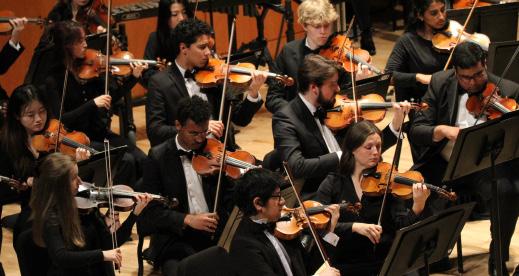
Scholarships and Graduate assistantships funded by donations to the Thursday Scholarship Fund make it possible for students to learn and pursue their passions at the Hugh Hodgson School of Music. Please consider a taxdeductible gift to the Thursday Scholarship Fund so we may continue to support our students and make their education possible. Scan the QR code now or reach out to Melissa Roberts at roberts@uga.edu or 706-254-2111.
In addition to our primary Support and Scholarship Funds, many specialized areas of interest, including our orchestra and choral programs, have support and scholarship funds you can contribute to directly. You can now learn more about all the ways and areas you can support the Hugh Hodgson School of Music. Scan the QR code or visit music.uga.edu/giving-and-alumni to the support the Hugh Hodgson School of Music area of your choice.
Gifts of all amounts are greatly appreciated. However, annual giving at the $1,500 level and higher provides membership in the Director’s Circle, our Hugh Hodgson School of Music Honor Roll. Director’s Circle members are invited to exclusive events and performances throughout the academic year.
For large gifts, please contact Melissa Roberts at roberts@uga.edu or 706-254-2111.
THANK YOU FOR YOUR CONTINUED SUPPORT OF THE UNIVERSITY OF GEORGIA HUGH HODGSON SCHOOL OF MUSIC.
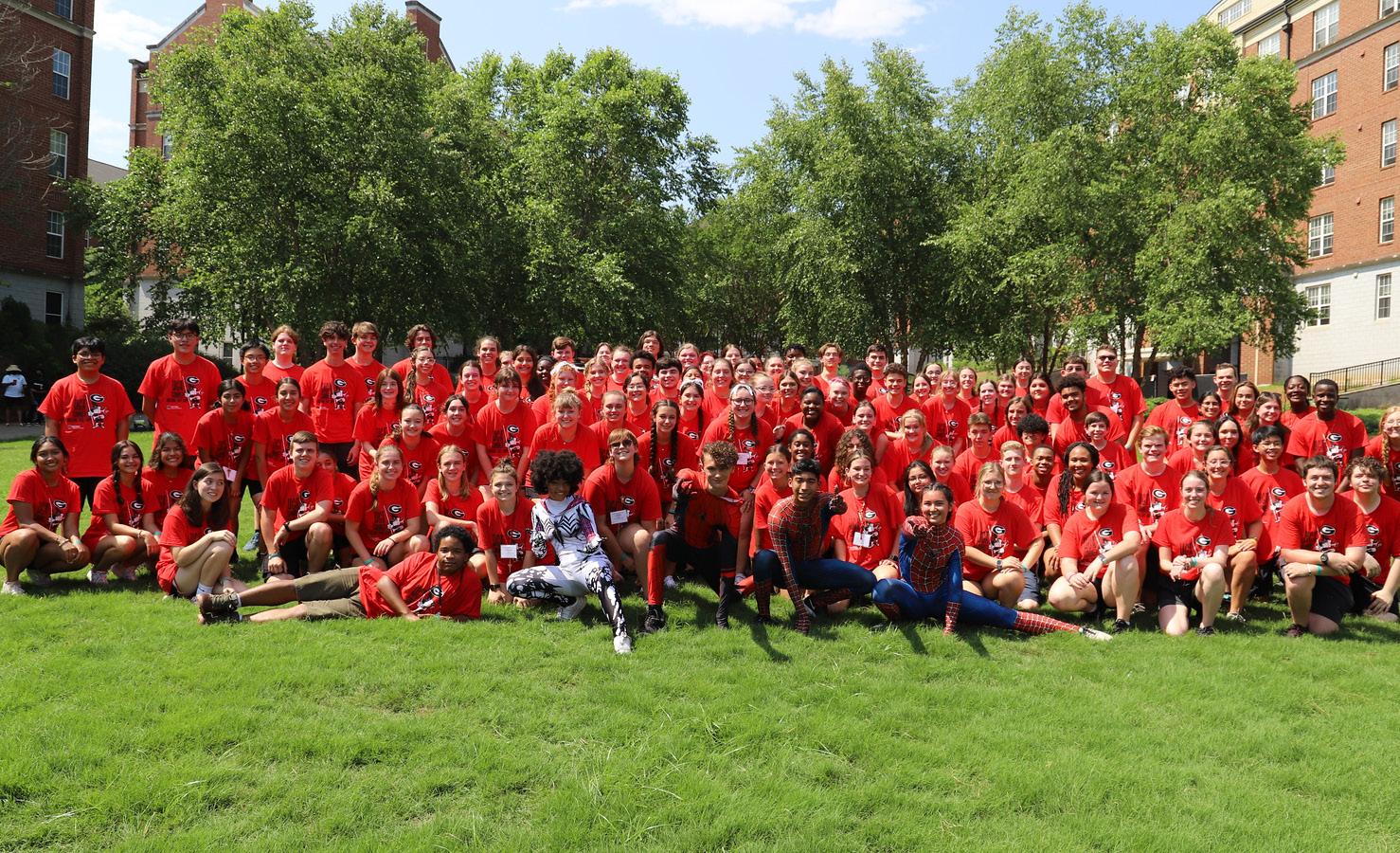
UGA’s Summer Marching Band Camp is an intensive five-day experience designed to help young marching band performers expand their skillsets. Our experts provide the personal level of attention required to help you master your specialty as drum majors, color guard members, and marching percussionists.
• Drum Major & Leadership Academy
Develop and refine your conducting and leadership skills under former and current drum majors of UGA’s acclaimed Redcoat Band. Learn to be an effective communicator both musically and through band leadership
• Color Guard
This camp serves students of all ability levels, from those who hope to audition into their high school guard, to drum corps and winter guard veterans. Students who wish to begin work or desire advanced instruction on rifle or sabre may have that opportunity at the discretion of the staff.
• Marching Percussion
Students audition into a camp drumline based on current ability level, and will learn and perform with this group. The curriculum will include technique, performance practice, along with performance and rehearsal repertoire appropriate for the student’s current demonstrated performance ability.


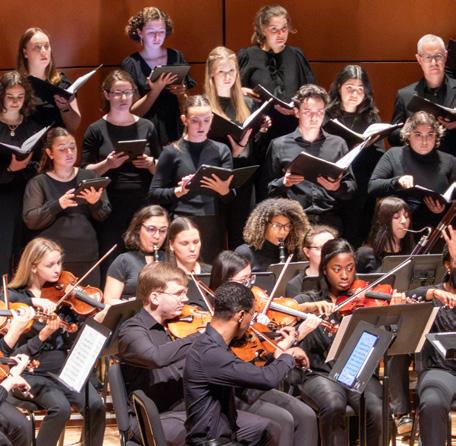
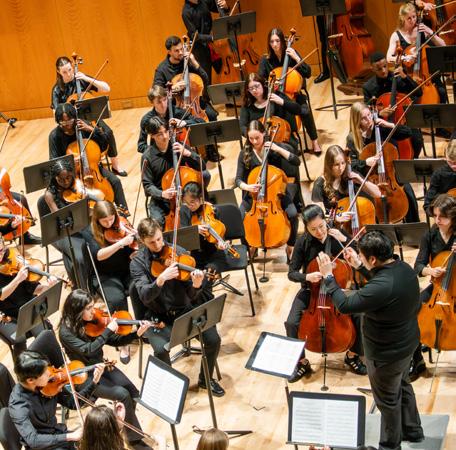
MON 4/28
3:30 p.m.
Ramsey Concert Hall FREE CONCERT
The Repertory Singers is a mixed chamber choir directed by graduate student conductors. Its format offers laboratory rehearsal and performance experience for conductors and singers alike. This group provides students with the opportunity to build knowledge and skill in the areas of sight-reading, conducting gesture, rehearsal techniques, and choral repertoire.
MON 4/28
7:30 p.m.
Hodgson Concert Hall FREE CONCERT
As one of the Hugh Hodgson School of Music’s large orchestral ensembles, the University Philharmonia offers an outlet for musical expression to all string players at the University of Georgia. The University Philharmonia is under the supervision of Mark Cedel. The ensemble is also conducted by graduate students majoring in orchestral conducting.
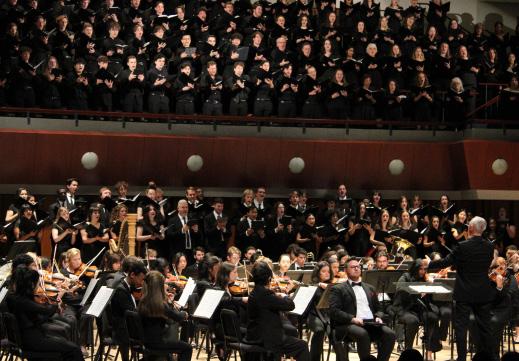

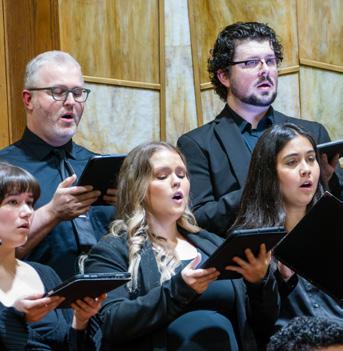
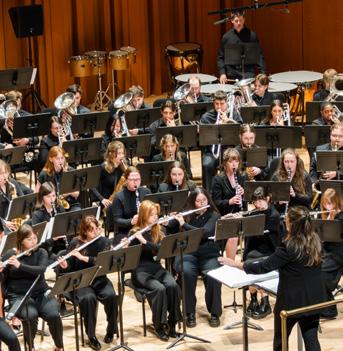
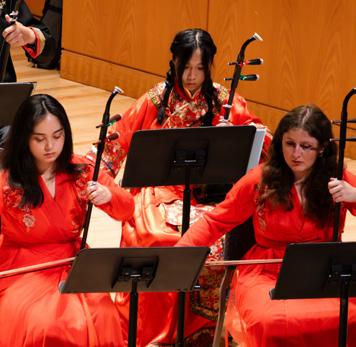
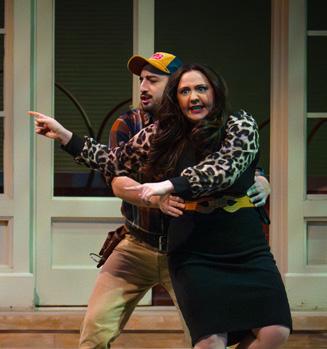
This year, over 20,000 patrons like you enjoyed over 300 performances at the Hugh Hodgson School of Music, including:
• 23 ticketed performances
• 35 free performances
• 35 fantastic student ensembles
• A fully-staged Mozart opera
• Two concert collaborations with UGA Presents
• Over 20 world-renowned guest artists
• Four Brand-New Faculty Chamber Ensembles
• Six incredible Faculty Artist Series Performances
• Over 150 student solo recitals and chamber groups
We cannot wait to have you back for our next season of performances. Look for our new 2025-26 Season Brochure this summer, as well as our Sforzando Magazine, for a complete story of the great music we will have for you this next academic year. To make sure you stay informed, scan this QR code and join our list. See you back here this fall!